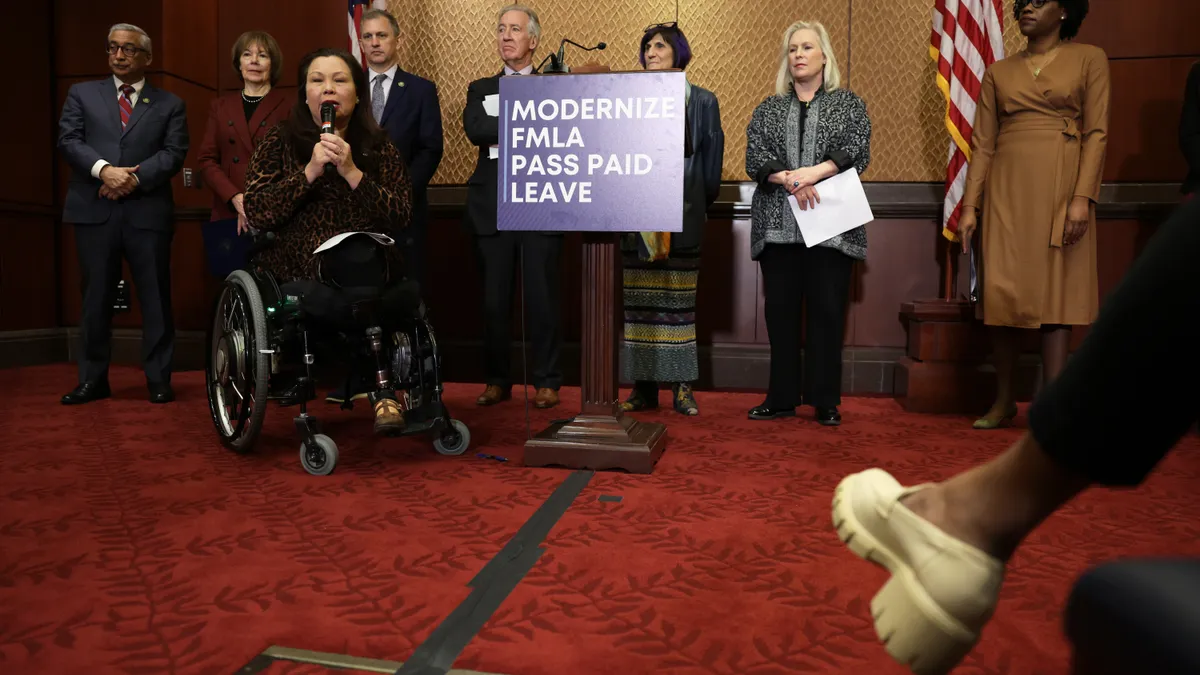Dive Brief:
- Two bills introduced in Congress Feb. 2 would bring the protections of the Family and Medical Leave Act to millions more workers, democratic lawmakers say.
- Rep. Lauren Underwood, D-IL, and Sen. Tina Smith, D-MN, reintroduced the Job Protection Act to close gaps in coverage for employees of small businesses, part-time workers and those either switching jobs or returning to the workforce. The legislators estimated the act would provide coverage to tens of millions more workers.
- Sen. Tammy Duckworth, D-IL, and Rep. Sean Casten, D-IL, reintroduced the ESP and School Support Staff Family Leave Act to extend the FMLA’s benefits to about 2.7 million education support professionals.
Dive Insight:
Lawmakers and supporters regard the FMLA, which was signed into law by President Bill Clinton Feb. 5, 1993, as landmark legislation that provided U.S. workers with job-protected leave. But they also see it as a stepping stone for expanding coverage to more workers and paid leave.
The Job Protection Act would offer FMLA protection to workers at any business with at least one employee, instead of the existing 50; get rid of the requirement that a worker log 1,250 hours at one employer during the year to qualify; and reduce the amount of time someone needs to be at a job to be eligible for leave from 12 months to 90 days, according to a fact sheet on the bill.
Today marks 30 years of the Family and Medical Leave Act! This law has given millions peace of mind while they take time off to care for their loved ones—but there’s work to be done.
— Rep. Lauren Underwood (@RepUnderwood) February 5, 2023
Come with me while I file my Job Protection Act, the largest expansion of FMLA since 1993 ⬇️ pic.twitter.com/Tt1Pu9WujE
“Currently, FMLA protects 56% of the workforce, and gaps in FMLA coverage leave out workers at small employers, folks working one or multiple part-time job positions and those re-entering the workforce or changing jobs. This means some of our most vulnerable workers are the least likely to be protected — people of color and low-wage workers,” Underwood said Monday during a U.S. Department of Labor event marking the 30th anniversary of the FMLA. “These gaps also disproportionately impact women, who are more likely to need leave but less likely to be eligible for job-protected leave under FMLA.”
The ESP and School Support Staff Family Leave Act would grant protection to school support staff, such as janitorial staff, food service workers, bus drivers and clerical support staff, who work more than 60% of the total monthly hours expected for their role, in line with a 2009 provision for airline flight crew workers.
“This gap in coverage means that many of the critical staff that we trust to help feed, transport or teach our students are unable to access basic benefits without risk of losing their job. As we continue to make our workplaces more equitable, improving and expanding the FMLA to cover our education support staff is essential,” Casten said in a news release.













